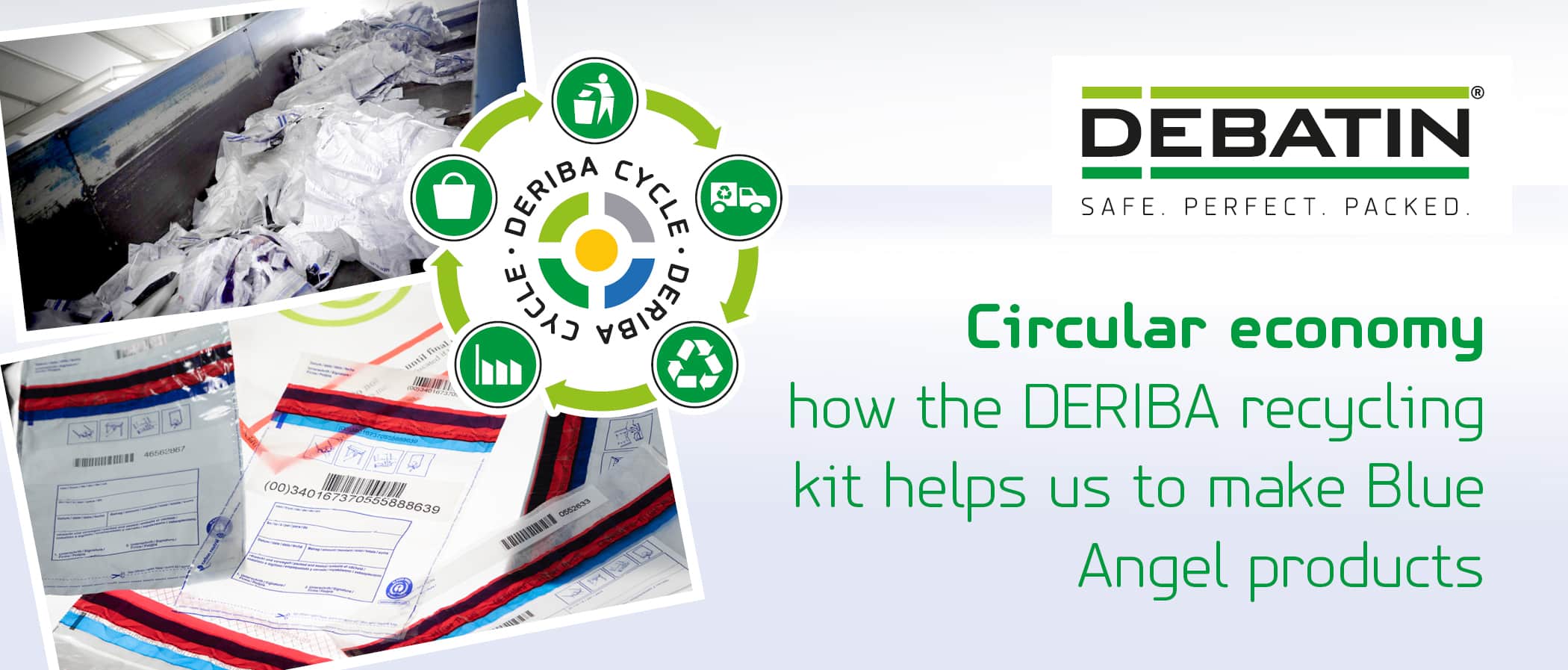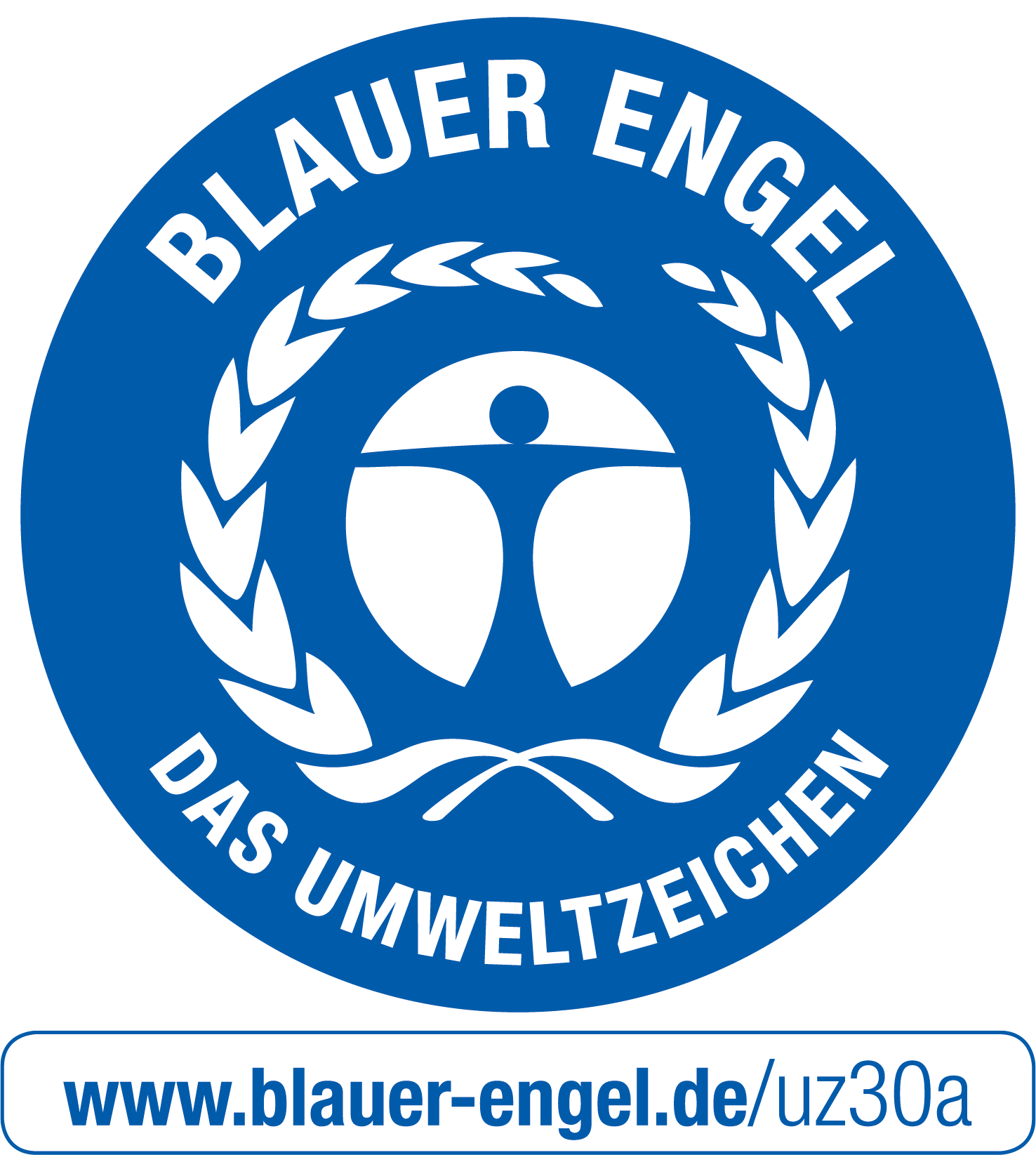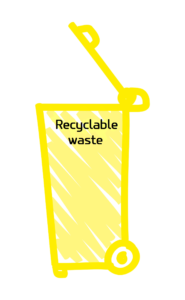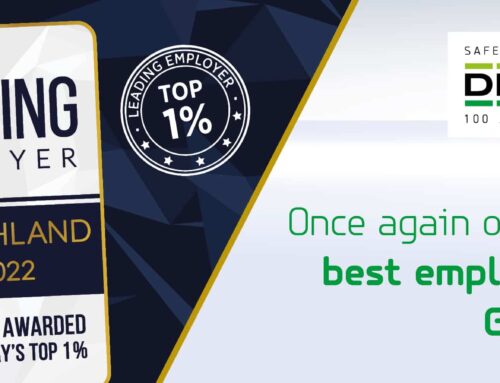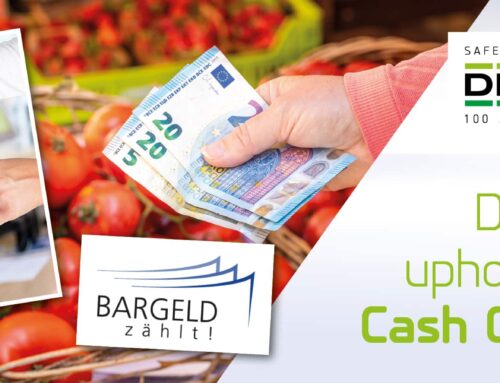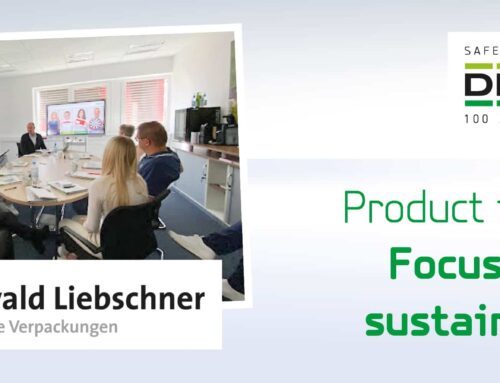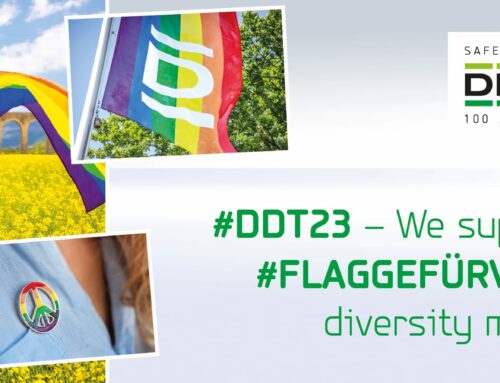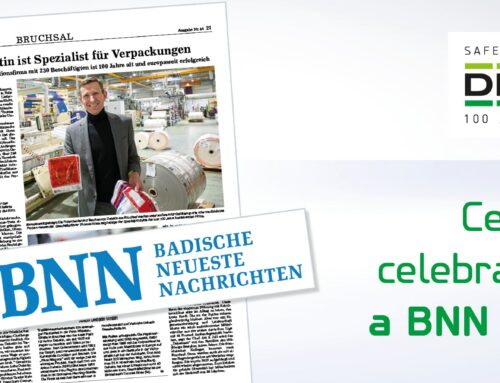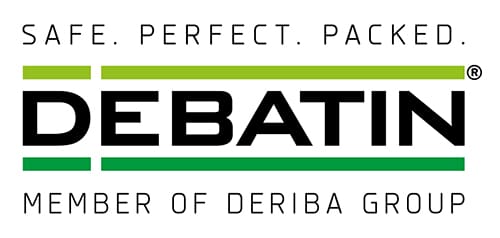Our sustainability strategy focuses on researching, developing and producing new, planet-friendly materials and products.
Working hand in hand with our partners in the DERIBA Group, we developed the “DERIBA CYCLE®”, our own recycling loop. This supports the circular economy and ensures that all products manufactured by the DERIBA Group are channelled into a suitable recycling process after use. It enables us to produce new recycled film which we use to make new, sustainable, Blue Angel-certified PCR film products such as our DEBAPOST® Second life mailing bags or our Second Life DEBASAFE security bags.
You are currently viewing a placeholder content from Default. To access the actual content, click the button below. Please note that doing so will share data with third-party providers.
More InformationHow recycling helps us make Blue Angel products
In Germany, used packaging is collected, sorted and recycled via the GREEN DOT system. Recycled materials (including film) are known as “post-consumer recycled materials”.
If a plastic product is made of at least 80 % PCR material, it can be submitted to RAL gGmbH for analysis. Then, if it ticks all the boxes, it’s awarded the Blue Angel eco-label. Independent experts subsequently review the chemical composition of the film and the quality and origin of the PCR material on a yearly basis. This ensures that waste film is returned to the correct closed-loop recycling system. All category DE-UZ 30a Blue Angel products are made of PCR plastics. Products are assigned a specific contract number and the respective manufacturers are listed on the Blue Angel website.
Material flows are closely monitored by the German Federal Environment Agency or state-certified experts, and strict regulations apply.
The DERIBA recycling kit
The DERIBA recycling kit enables our customers to collect their waste polyethylene packaging, return it to us, and thus play an important part in our recycling loop. It consists of a container in which customers collect their waste DEBATIN film. Once full, they simply return it to us, and we channel the waste film into our recycling process.
Thanks to this closed-loop system, we’re able to use far fewer virgin materials and can also considerably reduce our carbon emissions – which all helps protect our environment. At the same time, both we and our customers support the circular economy and keep the wheel turning.
Recycling film
Plastic film can be recycled, multiple times, with excellent results. The trickiest part, however, lies in separating the waste film into its different types and different quality grades. In order to recycle film well, it needs to be sorted cleanly into clear categories. The better the materials are sorted, the better the recycling results. Mixing different materials or quality grades increases the cost and effort involved in recycling, which means the entire process begins to lose its environmental benefits.
The rule of thumb: the better (“purer”) the quality of the waste film, the easier it is to recycle efficiently.
Quality grades for film:
LDPE film, transparent / natural (98 % transparent / 2 % colour)
- No foreign substances
- Film thickness: thin or thick
- May include stretch / air-bubble film; clean; occasional stickers / labels permitted; no foam wrap / builders rolls; no printed / coloured film
LDPE film, mixed (80 % transparent / 20 % colour)
- No builders rolls
- No foam wrap
- Occasional stickers / labels permitted
- Film thickness: thin or thick
- May include stretch film and air-bubble film
PE film, mixed (50 % transparent / 50 % colour)
- Occasional stickers / labels permitted
- Film thickness: thin or thick
- May include stretch film or air-bubble film
Must not include the following materials:
- Coated films (e. g., aluminium coating)
- Composite materials
- Rigid plastics
- Strapping
- Foam
- Garbage
- Foreign objects / materials
- Contaminated film (e.g., with oil, emulsions, construction waste, sludge etc.)
Our recycling solutions
By opting for our DERIBA recycling kit, you enable us to channel your waste film into the correct recycling loop – an assurance we give you in writing. We’ll be happy to supply you with our DERIBA recycling kit, which contains a box to collect your waste film. When the box is full, all you need to do is return it to us – secure in the knowledge that the waste really will be recycled in our loop. Your used film re-enters our loop via one of three routes, depending on the purity of the waste.
THE DERIBA CYCLE®
|
DERIBA + GREEN DOT (DERIBA recycling kit)
|
GREEN DOT
|
|---|---|---|
|
For waste film that has been sorted properly LDPE film must: … be sorted by colour, e.g., white / transparent / white-white-black
… not contain more than 5 % foreign substances (paper, adhesives, other additions) … class as sorting category “98/2 quality” … be compressed into bales and delivered on pallets (preferably a full lorry load) |
If the waste film is returned to us mixed with other waste, we forward it to Germany’s GREEN DOT waste recycling system. A company called SÜDROH Recycling GmbH helps us process our GREEN DOT waste. |
You can dispose of waste film via the GREEN DOT waste recycling system. Containers, yellow bins and yellow sacks are provided for this purpose. In Germany, various waste disposal companies are involved in the GREEN DOT system. They are responsible for collecting and recycling domestic and commercial packaging waste. |
| The recycling process |
|---|
|
Suitable waste film is selected and cleaned (BeRec) Once sorted and cleaned, the waste is melted down (BeRec) Aufschmelzen der sortierten und gereinigten Abfälle (BeRec) |
Sorted and cleaned (GREEN DOT) Bales of sorted, cleaned waste (from GREEN DOT) are forwarded to BeRec or: Once sorted and cleaned, the waste is melted down (SÜDROH / BeRec) |
Pre-sorted and cleaned (GREEN DOT) Bales of sorted, cleaned waste (GREEN DOT) are forwarded to BeRec or: Once sorted and cleaned, the waste is melted down (GREEN DOT) |
| PCR granules are extruded to create transparent or opaque PCR film (riba) |
| New products (safe bags, document pouches, mailing bags) are then manufactured from the PCR materials |
THE DERIBA CYCLE®
|
DERIBA / GREEN DOT |
GREEN DOT
|
|
|---|---|---|---|
| Protects valuable natural resources |  |
 |
 |
| Guarantees that waste is reused and does not contaminate the environment |  |
 |
 |
| Contributes to the circular economy by providing a steady supply of recycled film |  |
 |
 |
| Must be sorted properly | Yes | No | No |
| Costs | Costs for return | Costs for return | None |
| Environment |
+ Pre-sorted waste can be recycled with excellent results (to produce high-quality film) and results in a smaller carbon footprint. – Return journey generates carbon emissions |
+ Returning waste means it can be recycled with excellent results (to produce high-quality film), resulting in a smaller carbon footprint. – Return journey generates carbon emissions |
+ Efficient collection, sorting and recycling processes (energy efficient, reduces emissions by forwarding waste directly to the processing facility). |
|
What happens to the waste you collect? |
If waste film is sorted properly, it can be made into new film straight away. This supports the circular economy. |
On collection, the waste is compressed into bales or turned into granules for film (which is channelled back into the DERIBA loop). The granules can also be used for other products made of PCR plastic (packaging, textiles, plant pots, park benches etc.**) |
On collection, the waste is compressed into bales or turned into granules for film (which is channelled back into the DERIBA loop). The granules can also be used for other products made of PCR plastic (packaging, textiles, plant pots, park benches etc.**) |
| Disadvantages |
For each category, a large quantity (e.g., 1,000 kg) of waste has to be collected. The minimum quantity depends on the logistical cost-benefit ratio. |
Waste has to be sorted prior to collection. |
General remarks:
INTERSEROH Dienstleistungs GmbH awarded our products an impressive 19 out of 20 points for recyclability, entitling them to bear the label “Made for Recycling”. This indicates that a product is exceptionally easy to identify, sort and process in the recycling loop… and can be turned into a valuable new raw material.
Join our recycling loop!
Allow us to help you develop an efficient, planet-friendly strategy for your plastic waste (collection, disposal, recycling). We’ll tailor the strategy to your individual needs and requirements. Contact us!
You can contact the DEBATIN sales team by phone on +49 7251 8009 100 or send an email to vertrieb@debatin.de.
We look forward to hearing from you. Together we can make a lasting difference to help our planet and save resources!

